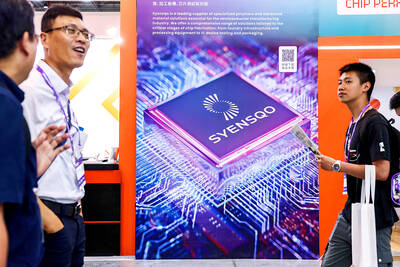Apple Inc has been lobbying the US government on tax breaks to support domestic chip production, suggesting the iPhone maker is keen to move more of its supply chain to the US.
In second and third-quarter disclosure reports, the company said that it lobbied officials from the US Department of the Treasury, Congress and the White House on tax topics including “issues related to tax credits for domestic semiconductor production.”
Since releasing its first custom processor in 2010, chips have become a major performance differentiator for Apple.
The company designs some of these components in house, but outsources production to Taiwan Semiconductor Manufacturing Co (TSMC, 台積電).
Many other parts for Apple devices are made in China. That has exposed the company to tariffs and other risks from a trade dispute between the US and China. Taiwan, where TSMC is based, has also become an increasing focus of geopolitical tension between China and the US.
Apple’s recent lobbying coincides with a push by the company and its partners to move some production away from China and even back to the US in a few cases.
There is also a broader effort by the US semiconductor industry to get government support for increased domestic production.
Apple’s US lobbying efforts are now mostly led by company veteran Tim Powderly, who was promoted around the time Cynthia Hogan, Apple’s prior top US lobbyist, left to join former US vice president Joe Biden’s presidential campaign.
An Apple spokesman declined to comment.
Earlier this year, TSMC said that it would build a US$12 billion chip plant in Arizona, and the company has been lobbying officials there for tax breaks.
In 2013, Apple started making a low-volume Mac Pro computer in the US.
Last year, it started using the same plant in Texas to conduct final assembly for a new version. That decision came after the company was granted tariff breaks.
Apple also sources components from several chipmakers that build some of their products in the US, including Broadcom Inc and Texas Instruments Inc.
Apple also has started using Qualcomm Inc again for iPhone modems, and the San Diego, California-based chipmaker builds some products domestically via production partner GlobalFoundries Inc.
Intel Corp, the current manufacturer of Mac’s main processors, builds some of its chips in the US.
However, when Apple moves to its own Mac chips next month, that would mean shifting production of that component to Taiwan.

SEMICONDUCTOR SERVICES: A company executive said that Taiwanese firms must think about how to participate in global supply chains and lift their competitiveness Taiwan Semiconductor Manufacturing Co (TSMC, 台積電) yesterday said it expects to launch its first multifunctional service center in Pingtung County in the middle of 2027, in a bid to foster a resilient high-tech facility construction ecosystem. TSMC broached the idea of creating a center two or three years ago when it started building new manufacturing capacity in the US and Japan, the company said. The center, dubbed an “ecosystem park,” would assist local manufacturing facility construction partners to upgrade their capabilities and secure more deals from other global chipmakers such as Intel Corp, Micron Technology Inc and Infineon Technologies AG, TSMC said. It

EXPORT GROWTH: The AI boom has shortened chip cycles to just one year, putting pressure on chipmakers to accelerate development and expand packaging capacity Developing a localized supply chain for advanced packaging equipment is critical for keeping pace with customers’ increasingly shrinking time-to-market cycles for new artificial intelligence (AI) chips, Taiwan Semiconductor Manufacturing Co (TSMC, 台積電) said yesterday. Spurred on by the AI revolution, customers are accelerating product upgrades to nearly every year, compared with the two to three-year development cadence in the past, TSMC vice president of advanced packaging technology and service Jun He (何軍) said at a 3D IC Global Summit organized by SEMI in Taipei. These shortened cycles put heavy pressure on chipmakers, as the entire process — from chip design to mass

People walk past advertising for a Syensqo chip at the Semicon Taiwan exhibition in Taipei yesterday.

NO BREAKTHROUGH? More substantial ‘deliverables,’ such as tariff reductions, would likely be saved for a meeting between Trump and Xi later this year, a trade expert said China launched two probes targeting the US semiconductor sector on Saturday ahead of talks between the two nations in Spain this week on trade, national security and the ownership of social media platform TikTok. China’s Ministry of Commerce announced an anti-dumping investigation into certain analog integrated circuits (ICs) imported from the US. The investigation is to target some commodity interface ICs and gate driver ICs, which are commonly made by US companies such as Texas Instruments Inc and ON Semiconductor Corp. The ministry also announced an anti-discrimination probe into US measures against China’s chip sector. US measures such as export curbs and tariffs